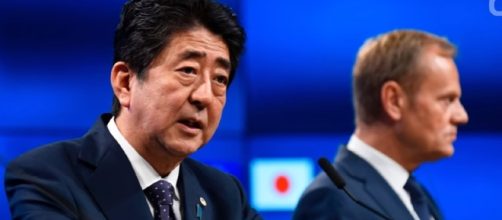The European Union and Japan are on track to sign a large trade agreement. It will directly benefit EU citizens by creating new jobs in Europe and will guarantee high protection standards for consumers. The agreement is expected to cover about 30 percent of world GDP and nearly 40 percent of international trade.
The Economic Partnership Agreement will surely give Japan's auto industry better access to European markets. The FTA will scrap the EU's ten percent tariff barrier on Japanese cars over a seven-year period. The deal is beneficial for the European food sector as Japan will resort to food imports, especially dairy products from Europe, which will be set over the course of 15 years.
Japan and Europe have a lot to gain and the U.S. has a lot to lose
The EU has the huge responsibility of pulling Europe out from its economic dilemma and one way to start is to attract Japan by taking advantage of the USA-Japan disagreement over trade policies. EU trade policy is to strive towards creating a free, fair and open trade, open up markets and to form a set of rules for all partner countries to adhere to and ensure a well-rounded development of all countries involved.
This is similar to Japan’s trade agenda even though Japan has a complex and overprotective policy over its trade, especially in the dairy and food sector. Japan has always remained a strong proponent of free trade. One other common binder between the two regions is that they are victims of the USA’s obstinate, self-centered policy of free trade.
The Trump Factor
With the G20 set to start on Friday, analysts feel that Japan and the European Union’s massive free trade deal is being seen as a challenge to the protectionist policies practiced by the current administration in the United States. President Trump's so-called "America first" policies and a few other countries taking on economic nationalism are considered a threat to global trade.
This trade agreement between Japan and the EU seeks to root out such impasse at ground level. Trump will see red if this trade deal turns out to be a major success. USA’s probability of tasting defeat as a trade superpower looms large over Trump’s administration. The irony is that Trump’s actions to keep Japan isolated only seem to bring the EU closer to Japan.
The hurdle which needs to be crossed
Japan and EU have a long way to go to bring common terms to the table which can be agreed by both parties. In the present scenario, terms are yet to be finalized for both sides to sign a deal. The main sticking point is Tokyo’s fairly protective nature of its local dairy market. The aim is to see 99 percent of goods traded between Japan and the EU with tariffs removed, but it could take years for some cases to take effect.
The upcoming G7 meeting, besides the G20 summit, will be seen as a platform to start negotiations between the two and Japan feels that it is important that one side does not back down at the time of signing the agreement citing national interests.


